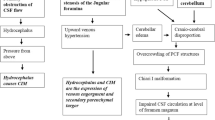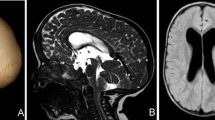Abstract
Introduction
Chiari malformation (CM) is a frequent finding in multisutural and syndromic craniosynostosis, occurring in 70% of patients with Crouzon’s syndrome, 75% with oxycephaly, 50% with Pfeiffer’s syndrome and 100% with the Kleeblattschädel deformity. The pathogenesis of this condition and rationale for treatment are still controversial.
Discussion
Since its first description in 1972, several factors have been cited to play a role in inducing CM. In the light of recent publications, the roles of premature fusion of cranial vault and cranial base sutures, of congenital anomalies of the cerebellum and brain stem, of raised intracranial pressure, of venous hypertension and of hydrocephalus are reviewed. Evaluation and management of CM are also discussed.
Conclusion
Chiari malformation appears to be an acquired and progressive condition that develops in the first months of life, because of a disproportion between hindbrain growth and an abnormally small posterior fossa, a consequence of the premature fusion of lambdoid and cranial base sutures. Venous hypertension caused by stenosis of the jugular foramen can also be present in these patients, resulting in intracranial hypertension and/or hydrocephalus. Careful MRI evaluation is recommended for the forms of craniosynostosis at a high risk of developing hindbrain herniation. The selection of posterior cranial vault expansion as the first surgical procedure is advocated. In selected cases, treatment of the posterior cranial deformity by occipital vault remodelling and treatment of the Chiari-like deformity by suboccipital decompression can be carried out using the same surgical procedure.












Similar content being viewed by others
References
Angle CR, McIntire MS, Moor R (1976) Cloverleaf skull Kleeblattschädel deformity syndrome. Am J Dis Child 114:198–202
Carmel PW (1988) Comment on Venes JL: Arnold–Chiari malformation in an infant with Kleeblattschädel: an acquired deformity? Neurosurgery 23:362
Chang YT, Tsai FJ, Shen WC, Lin HC, Peng CT, Tsai CH (2000) Antley–Bixler syndrome associated with Arnold–Chiari malformation. Acta Paediatr 89:737–739
Chiari H (1891) Über Veränderungen des Kleinhirns infolge von Hydrocephalie des Grosshirns. Dtsch Med Wochenschr 17:1172–1175
Chumas PD, Drake JM, Del Bigio MR (1992) Death from chronic tonsillar herniation in a patient with lumboperitoneal shunt and Crouzon’s disease. Br J Neurosurg 6:595–599
Chumas PD, Armstrong DC, Drake JM, Kulkarni AV, Hoffman HJ, Humphreys RP, Rutka JT, Hendrick EB (1993) Tonsillar herniation: the rule rather than the exception after lumboperitoneal shunting in the pediatric population. J Neurosurg 78:568–573
Chumas PD, Cinalli G, Arnaud E, Marchac D, Renier D (1997) Classification of previously unclassified cases of craniosynostosis. J Neurosurg 86:177–181
Cinalli G, Renier D, Sebag G, Sainte-Rose C, Arnaud E, Pierre-Kahn A (1995) Chronic tonsillar herniation in Crouzon and Apert syndrome: the role of the premature synostosis of the lambdoid suture. J Neurosurg 83:575–582
Cinalli G, Chumas P, Arnaud E, Sainte-Rose C, Renier D (1998) Occipital remodeling and suboccipital decompression in severe craniosynostosis associated with tonsillar herniation. Neurosurgery 42:66–73
Cinalli G, Sainte-Rose C, Kollar E, Arnaud E, Renier D (1998) Hydrocephalus and craniosynostosis. J Neurosurg 88:209–214
Collmann H, Sörensen N, Krauss J, Muhling J (1988) Hydrocephalus in craniosynostosis. Childs Nerv Syst 4:279–285
Enlow DH (1975) Handbook of facial growth. Saunders, Philadelphia
Fishman MA, Hogan GR, Dodge PR (1971) The concurrence of hydrocephalus and craniosynostosis. J Neurosurg 34:621–629
Francis PM, Beals S, Rekate HL, Pittmann HW, Manwaring K, Reiff J (1992) Chronic tonsillar herniation and Crouzon’s syndrome. Pediatr Neurosurg 18:202–206
Friede RL, Roesmann U (1989) Chronic tonsillar herniation. An attempt at classifying chronic herniation at the foramen magnum. Acta Neuropathol 34:214–235
Frim DM, Jones D, Goumnerova L (1990) Development of symptomatic Chiari malformation in a child with craniofacial dysmorphism. Pediatr Neurosurg 16:228–231
Fujisawa H, Hasegawa M, Kida S, Yamashita J (2002) A novel fibroblast growth factor receptor 2 mutation in Crouzon syndrome associated with Chiari type I malformation and syringomyelia. J Neurosurg 97:396–400
Girard N, Lasjaunias P, Taylor W (1994) Reversible tonsillar prolapse in vein of Galen aneurysmal malformations: report of eight cases and pathophysiological hypothesis. Childs Nerv Syst 10:141–147
Golabi M, Edwards MSB, Ousterhout DK (1987) Craniosynostosis and hydrocephalus. Neurosurgery 21:63–67
Greally MT, Carey JC, Milewicz DM, Hudgins L, Goldberg RB, Shprintzen RJ, Cousineau AJ, Smith WL Jr, Judisch GF, Hanson JW (1998) Shprintzen-Goldberg syndrome: a clinical analysis. Am J Med Genet 19:202–212
Hoffmann HJ, Tucker WS (1976) Cephalocranial disproportion. A complication of the treatment of hydrocephalus in children. Childs Brain 2:167–176
Hopkins TE, Haines SJ (2003) Rapid development of Chiari I malformation in an infant with Seckel syndrome and craniosynostosis. Case report and review of the literature. J Neurosurg 98:1113–1115
Kinal ME (1962) Hydrocephalus and the dural venous sinuses. J Neurosurg 19:195–201
Kreiborg S (1986) Postnatal growth and development of the craniofacial complex in premature craniosynostosis. In: Cohen MM Jr (ed) Craniosynostosis: diagnosis, evaluation, and management. Raven, New York, pp 157–189
Kreiborg S, Marsh JL, Cohen MM Jr, Liversage M, Pedersen H, Skovby F, Borgesen SE, Vannier MW (1993) Comparative three-dimensional analysis of CT-scans of the calvaria and cranial base in Apert and Crouzon syndromes. J Craniomaxillofac Surg 21:181–188
Lee HJ, Cho DY, Tsai FJ, Shen WC (2001) Antley-Bixler syndrome, description of two new cases and review of the literature. Pediatr Neurosurg 34:33–39
Marin-Padilla M, Marin-Padilla TM (1981) Morphogenesis of experimentally induced Arnold-Chiari malformation. J Neurol Sci 50:29–55
Martins AN, Kobrine AI, Larsen DF (1974) Pressure in the sagittal sinus during intracranial hypertension in man. J Neurosurg 40:603–608
Meyers GA, Orlow SJ, Munro JR et al (1995) Fibroblast growth factor receptor 3 (FGFR3) transmembrane mutation in Crouzon syndrome with acanthosis nigricans. Nat Genet 11:462–464
Milhorat TH (1998) Comment in: Cinalli G, Chumas P, Arnaud E, Sainte-Rose C, Renier D: Occipital remodeling and suboccipital decompression in severe craniosynostosis associated with tonsillar herniation. Neurosurgery 42:72
Morioka T, Shono T, Nishio S, Yoshida K, Hasuo K, Fukui M (1995) Acquired Chiari I malformation and syringomyelia associated with bilateral chronic subdural hematoma. J Neurosurg 83:556–558
Müller F, O’Rahilly (1980) The human chondrocranium at the end of the embryonic period, proper, with particular reference to the nervous system. Am J Anat 159:33–58
Mulliken JB, Steinberger D, Kunze S et al (1999) Molecular diagnosis of bilateral bicoronal synostosis. Plast Reconstr Surg 104:1603–1615
Nishikawa M, Sakamoto H, Hakuba A, Nakanishi N, Inoue Y (1997) Pathogenesis of Chiari malformation: a morphometric study of the posterior cranial fossa. J Neurosurg 86:40–47
Nyland H, Krogness KG (1978) Size of the posterior fossa in Chiari type 1 malformations in adults. Acta Neurochir 40:233–242
Park WJ, Meyers GA, Li X (1995) Novel FGFR2 mutations in Crouzon and Jackson–Weiss syndromes show allelic heterogeneity and phenotypic variability. Hum Mol Genet 4:1229–1233
Pollack IF, Losken HW, Biglan AW (1996) Incidence of increased intracranial pressure after early surgical treatment of syndromic craniosynostosis. Pediatr Neurosurg 24:202–209
Pollack IF, Losken HW, Hurwitz DJ (1996) A combined frontoorbital and occipital advancement technique for use in total calvarial reconstruction. J Neurosurg 84:424–429
Ray BS, Dunbar HS (1951) Thrombosis of the dural venous sinuses as a cause of “pseudotumor cerebri”. Ann Surg 134:376–386
Reardon W, Winter RM, Rutland P (1994) Mutations in the fibroblast growth factor receptor 2 gene cause Crouzon syndrome. Nat Genet 8:98–103
Rekate HL (1992) Brain turgor (Kb): intrinsic property of the brain to resist distortion. Pediatr Neurosurg 18:257–262
Rengachary SS, Blount J, Heros D, Bowers S, Truwit C (1997) Craniocephalic disproportion with increased intracranial pressure and brain herniation: a new clinical syndrome in anemic patients: report of two cases. Neurosurgery 41:297–304
Renier D, Sainte-Rose C, Marchac D, Hirsch JF (1982) Intracranial pressure in craniosynostosis. J Neurosurg 57:370–377
Renier D, Sainte-Rose G, Sainte-Rose C, Marchac D (1995) Recurrent craniosynostosis: when and why? Presented at the Consensus Conference on Pediatric Neurosurgery: Craniosynostosis 95, Rome, 3–6 May 1995
Renier D, Arnaud E, Cinalli G, Sebag G, Zerah M, Marchac D (1996) Prognosis for mental function in Apert’s syndrome. J Neurosurg 85:66–72
Renier D, Cinalli G, Lajeunie E, Arnoud E, Marchac D (1997) L’oxycéphalie, une craniosténose sévère. A propos d’une série de 129 cas. Arch Pediatr 4:722–729
Richtsmeier JT (1987) Comparative study of normal, Crouzon and Apert craniofacial morphology using finite element scaling analysis. Am J Phys Anthropol 74:473–493
Richtsmeier JT (1988) Craniofacial growth in Apert syndrome as measured by finite-element scaling analysis. Acta Anat 133:50–56
Richtsmeier JT, Lele S (1990) Analysis of craniofacial growth in Crouzon syndrome using landmark data. J Craniofac Genet Dev Biol 10:39–62
Robson CD, Mulliken JB, Robertson RL, Proctor MR, Steinberger D, Barnes PD, McFarren A, Muller U, Zurakowski D (2000) Prominent basal emissary foramina in syndromic craniosynostosis: correlation with phenotypic and molecular diagnoses. Am J Neuroradiol 21:1707–1717
Rollins N, Booth T, Shapiro K (2000) MR venography in children with complex craniosynostosis. Pediatr Neurosurg 32:308–315
Sainte-Rose C, LaCombe J, Pierre-Khan A, Renier D, Hirsh JF (1984) Intracranial venous sinus hypertension: cause or consequence of hydrocephalus in infants? J Neurosurg 60:727–736
Saldino RM, Steinbach HL, Epstein CJ (1972) Familial acrocephalosyndactyly (Pfeiffer syndrome). Am J Roentgenol 116:609–622
Sgouros S, Goldin JH, Hockley AD, Wake MJC (1996) Posterior skull surgery in craniosynostosis. Childs Nerv Syst 12:727–733
Sgouros S, Natarajan K, Hockley AD, Goldin JH, Wake M (1999) Skull base growth in childhood. Pediatr Neurosurg 31:259–268
Sgouros S, Natarajan K, Hockley AD, Goldin JH, Wake M (1999) Skull base growth in craniosynostosis. Pediatr Neurosurg 31:281–293
Shigeta H, Sakai K (1996) [Chiari malformation (chronic tonsillar herniation) and syringomyelia in Crouzon’s syndrome] (in Japanese). Nerv Syst Child 21:395–401
Shiroyama Y, Ito H, Yamashita T et al (1991) The relationship of cloverleaf skull syndrome to hydrocephalus. Childs Nerv Syst 7:382–385
Steinbok P, Hall J, Flodmark OP (1989) Hydrocephalus in achondroplasia: the possible role of intracranial venous hypertension. J Neurosurg 71:42–48
Stovner LJ, Bergan U, Nilsen G, Sjaastad O (1993) Posterior cranial fossa dimensions in the Chiari I malformation: relation to the pathogenesis and clinical presentation. Neuroradiology 35:113–118
Taylor WJ, Hayward RD, Lasjaunias P, Britto JA, Thompson DNP, Jones BM, Evans RD (2001) Enigma of raised intracranial pressure in patients with complex craniosynostosis: the role of abnormal intracranial venous drainage. J Neurosurg 94:377–385
Thompson DN, Harkness W, Jones BM, Hayward RD (1997) Aetiology of herniation of the hindbrain in craniosynostosis. An investigation incorporating intracranial pressure monitoring and magnetic resonance imaging. Pediatr Neurosurg 26:288–295
Thompson DNP, Hayward RD, Harkness WJ, Bingham RM, Jones BM (1995) Lessons from a case of kleeblattschädel. Case report. J Neurosurg 82:1071–1074
Tubbs RS, Elton S, Blount JP, Oakes WJ (2001) Preliminary observations on the association between simple metopic ridging in children without trigonocephaly and the Chiari I malformation. Pediatr Neurosurg 35:136–139
Venes JL (1988) Arnold-Chiari malformation in an infant with Kleeblattschädel: an acquired deformity? Neurosurgery 23:360–362
Venes JL (1998) Comment in: Cinalli G, Chumas P, Arnaud E, Sainte-Rose C, Renier D: Occipital remodeling and suboccipital decompression in severe craniosynostosis associated with tonsillar herniation. Neurosurgery 42:71–72
Wall SA, Goldin JH, Hockley AD, Wake MJC, Poole MD, Briggs M (1994) Fronto-orbital re-operation in craniosynostosis. Br J Plast Surg 47:180–184
Zerah M, Garcia-Monaco M, Rodesch G, Terbrugge K, Tardieu M, de Victor D, Lasjaunias P (1992) Hydrodynamics in vein of Galen malformations. Childs Nerv Syst 8:111–117
Acknowledgements
All the patients described in this paper were evaluated and treated in the Department of Pediatric Neurosurgery of the Hôpital Necker-Enfants Malades, Paris, France.
Author information
Authors and Affiliations
Corresponding author
Rights and permissions
About this article
Cite this article
Cinalli, G., Spennato, P., Sainte-Rose, C. et al. Chiari malformation in craniosynostosis. Childs Nerv Syst 21, 889–901 (2005). https://doi.org/10.1007/s00381-004-1115-z
Received:
Published:
Issue Date:
DOI: https://doi.org/10.1007/s00381-004-1115-z




